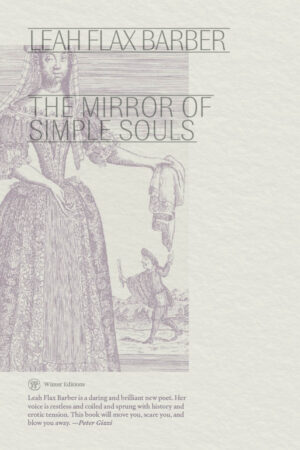The Mirror of Simple Souls
by Leah Flax Barber
reviewed by Benjamin Paul
Leah Flax Barber’s debut collection, The Mirror of Simple Souls, brings the mysteries of two historical worlds into dialogue. The first is medieval mysticism—the collection takes its name from Marguerite Porete’s fourteenth-century treatise on the soul’s “annihilation” as it is stripped of its particularity and attains divine love. The second is the commedia dell’arte, the comic theater of stock character masks that blossomed in the Italian Renaissance and has undergone frequent revivals and variations since. This unlikely pairing balances the competing interests of Flax Barber’s poetry: on the one hand, a pull toward an unknowable life of the spirit, and on the other toward the performance of identity through social and historical masks.
In the book’s first section, Flax Barber uses the persona of one stock character—the servant girl Columbina—to explore this tension. In the commedia dell’arte, Columbina is a savvy manipulator of surfaces: she is often the object of amorous attention, and she knows how to bend that attention to her will. But Flax Barber makes the startling decision to present this thoroughly social creature in moments of solitary reflection. We are made to wonder who is behind the mask when it is at rest—whether that be the actress temporarily donning Columbina’s costume, or the inner being of the character herself. Here is Columbina in the first poem of the opening sequence:
I escape my alias
On the back of a mule
A stiff glittering thread running
Through it
Beyond danger
The desert being anywhere
Where nothing is
This journey aligns Flax Barber’s theatrical and mystical interests. At the beginning is the social surface, the “alias” of the self-as-character, and at the end is nothingness. But who exactly is the “I” who threads this gap? How indebted is she to her alias? Columbina is not quite sure: “The shape of my character starts / Not in mind but in my experience,” she offers in another poem. That shape is of course well-documented in Columbina’s various stage functions, and Flax Barber shows a fascination with the way this character has both disappeared and endured over time. Her chosen spelling of “Columbina” is an amalgam of the Italian and French names that, we are told, “never existed anywhere.” Through Columbina, she suggests that the stock character’s history of shifting conventions—marked by repetition with variation—is a compelling model for the self:
Form protects me
From extinction
Form repeats
Still you may press down
On the old for the new
The Mirror of Simple Souls is a book interested in art and artifice (through Flax Barber’s eyes, these would seem to be the operating terms for anything short of mystical annihilation), and pressing down on the old for the new is also its stance toward the art of poetry. Flax Barber fits within a cadre of contemporary poets who blend scholarly erudition with formally experimental verse—I was reminded especially of the work of Joyelle McSweeney, Ben Lerner, and Zoë Hitzig. Hers is a quiet formalism, however: the double-spaced lines, lack of punctuation, and white space pauses of the above passages are present throughout the collection. This compels an attentive reading, as fragments reassemble and diverge into variants along the way. “The illusion of ending is art,” says a later poem in the collection; The Mirror of Simple Souls asks what it would mean to briefly suspend that illusion.
After the first section’s exploration of the speaking self, Flax Barber sheds the Columbina persona but keeps up the inherent tensions of its voice. The second section, “Cryptomnesia,” consists of reflections prompted by cultural objects: Shakespeare’s King Lear and Antony and Cleopatra are invoked, as are songs by Kate Bush, Buddy Holly, and Lou Reed. The section’s title refers to the phenomenon of mistaking a remembered idea for one’s own original thought, a somewhat cheeky description of Flax Barber’s elaborative mode of reading that we imagine she might also apply to the original texts. This impression is confirmed by the book’s third and final section, called “Saturnalia” after the ancient carnival that perhaps inspired the commedia. Flax Barber now delivers a sequence of more intimate poems on love, desire, and daily life; after she has taught us to see all art as collective dream, we sense that she is now entering the pantomime herself.
This progression is effective: instead of treating the situation of the twenty-first-century poet with a knowing irony, Flax Barber reconstructs the uncertain grounds of poetry in a way that embraces its genuine potential for expression, longing, and transcendence. The scholarly refinement of these poems does not detract from their pleasure, which is consistent throughout the collection. Like a commedia actor, Flax Barber tends to flit between playfulness and sincerity in a single scene. Her poems are by turns irreverent (“Jesus ate crazy amounts of bread”) and philosophical (“Objects become dangerous / No they show their danger”), erotic (“Like fucking a fume / Away / This flame”) and cryptically beautiful (“A website of snow // So red it stains your eye / Stains your eyes green and red // When you look away from it”). They deploy the modern with a light touch, pressing gently on the tradition of metaphysical poetry for something new:
Will it all be destroyed?
Definitely
I will hear it on my radio
In the 22nd century
It will be like a snow globe inside me
Life barbaric
And delicate lyric
There is perhaps no better encapsulation of The Mirror of Simple Souls than this lovely image of the end of the world in the snow globe in the mind. Flax Barber’s poetry is insistently both of the world and apart from it. Like Columbina, she considers life’s barbarism and its delicacy on the obscure stage of private experience, watches it carefully, and comes back with a smile to rejoin the troupe.
Published on July 15, 2025

